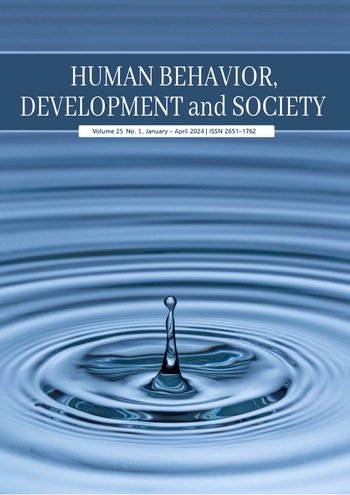Using Tsunesaburo Makiguchi’s Value-Creating Education to Cultivate Humanistic Behaviorists: A Case Study
Main Article Content
Abstract
Applied behavior analysis (ABA) has gained increasing attention in many countries across education, psychology, healthcare, organizational management, and social work. ABA is a research-based approach to help individuals develop socially significant behavior and improve their lives. Different countries have organizations to provide training and certification programs locally, nationally, and internationally such as the Association for Behavior Analysis International (ABAI), the Asians and Pacific Islanders Association for Behavior Analysis (APIABA), and the Malaysia Association of Behaviour Analysis (MABA). For years, ABA has been focused on individual, egocentric, and self-oriented behavior. Because behavior changes cannot happen without one’s inner breakthroughs and resolutions to be the change, it is necessary to center ABA practice on humanistic, compassionate, and socially-oriented behavior to sustain human well-being and the development of society. In this article, we use the ABA programs in higher education accredited by ABAI as a case study to explore how the value-creating education framework developed by Tsunesaburo Makiguchi can cultivate humanistic behavior analysts. ABAI verifies university programs in the United States, Canada, Australia, and the United Kingdom to fulfill the Behavior Analyst Certified Board (BACB)’s coursework requirements. This case study, emphasizing humanity in behavioral analysis, can potentially maximize the practice of ABA globally.
Article Details

This work is licensed under a Creative Commons Attribution-NonCommercial-NoDerivatives 4.0 International License.
Copyright: Asia-Pacific International University reserve exclusive rights to publish, reproduce and distribute the manuscript and all contents therein.
References
Behavior Analyst Certification Board (BACB) (2023a). U.S. licensure of behavior analysts. https://www.bacb.com/u-s-licensure-of-behavior-analysts/
Behavior Analyst Certification Board (BACB) (2023b). Credentials. https://www.bacb.com/
Bethune, K. S., & Kiser, A. (2017). Doing more with less: innovative program building in aba and special education in a rural setting. Rural Special Education Quarterly, 36(1), 25-30. https://doi.org/10.1177/8756870517703395
Birnbaum, A. & Bethel, D. M. (1989). Education for creative living: Ideas and proposals of Tsunesaburo Makiguchi. Soka Gakkai / Iowa State University Press.
Bhardwaj, A. (2016). Importance of education in human life: A holistic approach. International Journal of Science and Consciousness, 2(2), 23-28.
Cooper, J. O., Heron, T. E., & Heward, W. L. (2020). Applied behavior analysis (2nd ed.). Upper Saddle River, NJ: Pearson Education.
Deochand, N., Fuqua, R. W. (2016). BACB certification trends: State of the states (1999 to 2014). Behavior Analysis Practice, 9, 243–252. https://doi.org/10.1007/s40617-016-0118-z
Dickson, K., Khan, M., Zlatev, V. (2022). ABA@BU program competitiveness and ABA graduates employability support. In: Zlateva, T., Goleva, R. (eds) Computer science and education in computer science. CSECS 2022. Lecture notes of the Institute for Computer Sciences, Social Informatics and Telecommunications Engineering, vol 450. Springer, Cham. https://doi.org/10.1007/978-3-031-17292-2_20
Fong, E. H., Ficklin, S., & Lee, H. Y. (2017). Increasing cultural understanding and diversity in applied behavior analysis. Behavior Analysis: Research and Practice, 17(2), 103–113. https://doi.org/10.1037/bar0000076
Gebert, A., & Joffee, M. (2007). Value creation as the aim of education: Tsunesaburo Makiguchi and Soka education. Ethical visions of education: Philosophies in Practice, 65-82.
Goulah, J. & Gebert, A. (2009). Tsunesaburo Makiguchi: Introduction to the man, his ideas, and the special issue. Educational Studies, 45(2), 115-132. https://doi.org/10.1080/00131940902762144
Goulah, J. (2009). Makiguchi in the “fractured future”: Value-creating and transformative world language learning. Educational Studies, 45(2), 193-213. https://10.1080/00131940902762243
Goulah, J. (2021). Value creation and value-creating education in the work of Daisaku Ikeda, Josei Toda, and Tsunesaburo Makiguchi. Oxford Research Encyclopedia of Education. https://doi.org/10.1093/acrefore/9780190264093.013.1137
Higgins, J.W. & Williams, R.L. & McLaughlin, T. F. (2001). The effects of a token economy employing instructional consequences for a third-grade student with learning disabilities: A data-based case study. Education and Treatment of Children, 24. 99-106.
Hilton, J., Syed, N., Weiss, M. J., Tereshko, L., Marya, V., Marshall, K., Gatzunis, K., Russell, C. & Driscoll, N. (2021). Initiatives to address diversity, equity, and inclusion within a higher education ABA department. Behavior and Social Issues, 30, 58–81. https://doi.org/10.1007/s42822-021-00082-y
Ikeda Center (2011). The greater self. Ikeda Center for Peace, Learning, and Dialogue. https://www.ikedacenter.org/ikeda-forum/2011-greater-self/ikeda-excerpts
Ikeda, D. (2000). Building a society that serves the essential needs of education: some views on education in the twenty-first century. https://www.daisakuikeda.org/main/educator/education-proposal/educ-proposal-2000.html
Ikeda, D. (2002). The wisdom of the Lotus Sutra (Volume IV). World Tribune Press.
Leaf, J. B., Cihon, J. H., Ferguson, J. L., & Weinkauf, S. M. (2017). An introduction to applied behavior analysis. Handbook of Childhood Psychopathology and Developmental Disabilities Treatment, 25–42. https://doi.org/10.1007/978-3-319-71210-9_3
Makrygianni, M. K., Gena, A., Katoudi, S., & Galanis, P. (2018). The effectiveness of applied behavior analytic interventions for children with autism spectrum disorder: A meta-analytic study. Research in Autism Spectrum Disorders, 51, 18–31. https://doi.org/10.1016/j.rasd.2018.03.006
Matsuda, K., Garcia, Y., Catagnus, R., & Brandt, J. A. (2020). Can behavior analysis help us understand and reduce racism? A review of the current literature. Behavior analysis in practice, 13(2), 336–347. https://doi.org/10.1007/s40617-020-00411-4
Morris, E. K., Smith, N. G., & Altus, D. E. (2005). B. F. Skinner’s contributions to applied behavior analysis. The Behavior Analyst, 28(2), 99–131.
Sharma, N. (2018). Makiguchi, Ikeda, and Gandhi: A brief comparative study. Value-Creating Global Citizenship Education, 15-41. https://doi.org/10.1007/978-3-319-78244-7_2
Skinner, B. F. (1974). About behaviorism. New York: Knopf.
Skinner, B. F. (1984). The operational analysis of psychological terms. The Behavioral and Brain Sciences, 7, 547–581.
Skinner, B. F. (1993). About behaviorism. London: Penguin. (Original work published 1974).
Steele, D. (1995). Gentle teaching: A value-based framework for helping others. https://eric.ed.gov/?id=ED381983
Takahashi, T. (2020). Tsunesaburo Makiguchi and school leadership in action. Oxford Research Encyclopedia of Education. https://doi.org/10.1093/acrefore/9780190264093.013.723
Tendhar, T., Bueno de Mesquita, P. (2020). Compassion education for prosocial behavior and well-being among college students. Journal of Mental Health and Social Behavior, 2(1), 115–120. https://doi.org/10.33790/jmhsb1100115
Yin, R. K. (2018). Case study research and applications: Design and methods (6th ed.). SAGE Publications.


